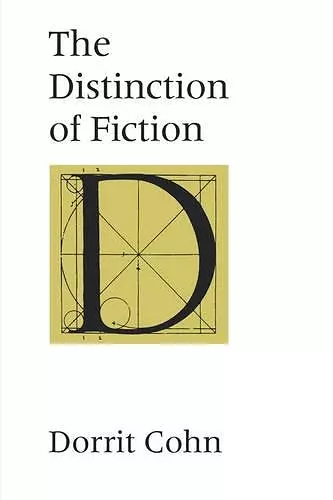The Distinction of Fiction
Format:Paperback
Publisher:Johns Hopkins University Press
Published:26th Jan '01
Currently unavailable, and unfortunately no date known when it will be back

Dorrit Cohn provides us with a comprehensive survey of the controversy about the relation between factual and fictional narration, and shows how it might be resolved. As a reference-point (and perhaps a lightning-rod) for future discussion, the book will be required reading for narratologists, and will attract the attention of all those who teach fiction. -- Wallace MartinUniversity of Toledo, author of Recent Theories of Narrative and editor of The Yale Critics: Deconstruction in America
An expansion of Cohn's Christian Gauss lectures at Princeton and the product of many years of labor and thought, The Distinction of Fiction builds on narratological and phenomenological theories to show that boundaries between fiction and history can be firmly and systematically explored.Winner of the Modern Language Association's Aldo and Jeanne Scaglione Prize for Comparative Literary Studies The border between fact and fiction has been trespassed so often it seems to be a highway. Works of history that include fictional techniques are usually held in contempt, but works of fiction that include history are among the greatest of classics. Fiction claims to be able to convey its own unique kinds of truth. But unless a reader knows in advance whether a narrative is fictional or not, judgment can be frustrated and confused. In The Distinction of Fiction, Dorrit Cohn argues that fiction does present specific clues to its fictionality, and its own justifications. Indeed, except in cases of deliberate deception, fiction achieves its purposes best by exercising generic conventions that inform the reader that it is fiction. Cohn tests her conclusions against major narrative works, including Proust's A la Recherche du temps perdu, Mann's Death in Venice, Tolstoy's War and Peace, and Freud's case studies. She contests widespread poststructuralist views that all narratives are fictional. On the contrary, she separates fiction and nonfiction as necessarily distinct, even when bound together. An expansion of Cohn's Christian Gauss lectures at Princeton and the product of many years of labor and thought, The Distinction of Fiction builds on narratological and phenomenological theories to show that boundaries between fiction and history can be firmly and systematically explored.
Offers some very fine analysis of a range of narratives from Freud's case histories to Tolstoy's War and Peace... An important contribution to narrative theory and a salutary intervention in the debate about the relation between fiction and nonfiction... Cohn argues with clarity, learning, and patient logic. -- James Phelan Modern Fiction Studies The first chapter, which anatomizes the various meanings of the term 'fiction' in critical discourse, shows Cohn at her best, scrupulously and methodically distinguishing between shifting and rival senses of the term 'fiction.'. -- Brian Richardson Novel [T]his collection offers a convenient way of sampling the ideas of a well respected critic who has had substantial and lasting impact on narratological studies. -- Hollie Markland Harder French Review Dorrit Cohn demolishes, with remorseless and elegant clarity, the view, fashionable among some literary theorists, that there is ultimately no distinction between historical and fictional narrative. -- Michael Bell Yearbook of English Studies Elegantly written and demonstrates an impressive knowledge of scholarship in the theoretical field of narratology. -- Amy J. Elias Journal of English and Germanic Philology The Distinction of Fiction will [become] required reading for all those interested in the formal workings of narrative... Readers willing to trace and retrace the rigorous intricacies of Cohn's presentation will find that the effort leads to ample and even exhilarating rewards. -- Patrick O'Neill Seminar Careful and lucid theoretical work in narratology. -- Ursula Mahlendorf Colloquia Germanica
- Winner of Modern Language Association Aldo and Jeanne Scaglione Prize for Comparative Literary Studies 1999 (United States)
ISBN: 9780801865220
Dimensions: 229mm x 152mm x 13mm
Weight: 283g
208 pages